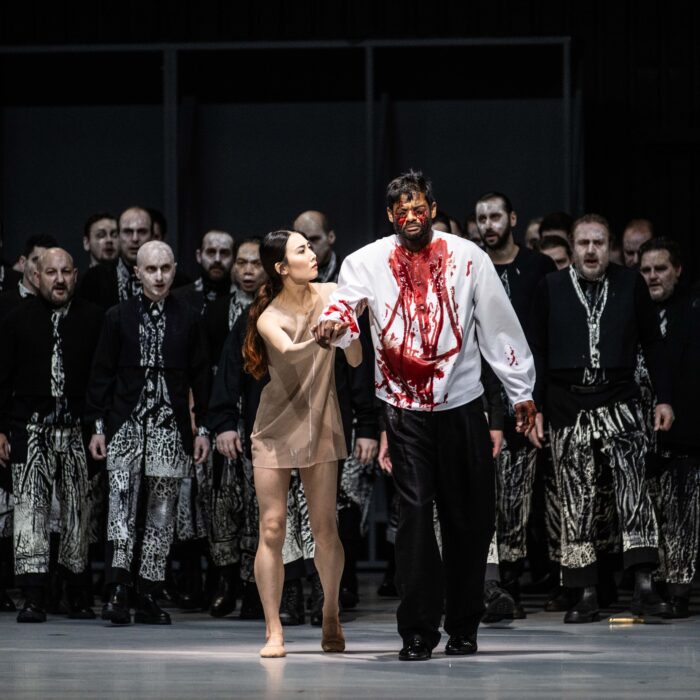
Gran Teatre del Liceu 2017-18 Review – Demon: The Devil’s In The Detail – Or Lack Thereof.
By Jonathan SutherlandFor most opera connoisseurs west of Kaliningrad, the name Anton Rubinstein is unlikely to ring many glockenspiels. This acclaimed composer and pianist, considered the virtuosic equal of Liszt, actually wrote twice as many operas as Puccini but outside Russia, his music is virtually unknown. Productions in the west of his most successful opera “Demon” are as rare as a real Romanov. They usually come about by either adventurous artistic planning (the Wexford Festival in 1994), as a vehicle for a star singer (Kristine Opolais in Riga in 2003 or Dmitri Hvorostovsky in Brussels in 2015) or passionate Russian music proselytizing (Valery Gergiev at the Barbican, also in 2015).
The most recent full staging of Rubinstein’s adaption of Mikhail Lermontov’s intensely poetic text was a multi-national co-production including the illustrious Gran Teatre del Liceu in Barcelona, which presented the opera for the first time in Spain in the original Russian. The production was created for Dmitri Hvorostovsky, who died before being able to bring his definitive interpretation to a wider western audience.
Unlike Moussorgsky’s “Boris Godunov” which is as Russian as borscht and babushkas, Rubinstein’s “Demon” looks more to the West and the influence of Berlioz and Gounod is evident. “La Damnation de Faust,” with its epic seven-part chorus, was staged 30 years before “Demon” and is reflected in much of Rubinstein’s luxuriant orchestration. Stirring choruses are as integral to Russian operatic tradition as pretty pas de deux are an impermeable part of opera in Paris and Rubinstein was especially effective in his ensemble writing. Multiple choruses cover almost every human, animal, vegetable or mineral entity. The partitura not only mentions infernal and heavenly spirits but water streams, evening zephyrs, trees, flowers, rocks, girls, companions, Tartars and the obligatory nuns and angels. Presumably, in the interests of tighter dramaturgy, conductor Mikhail Tatarnikov cut close to 20 minutes from the score, making it similar to the Anissimov/Maizel production in Wexford, which also shredded the chorus for men and dance for women in Act two.
Lost in Space…
Dmitry Bertman and Hartmut Schörghofer’s mis-en-scène was unquestionably visually arresting. Unfortunately, unlike most arrests, it did not presage conviction. Instead of Pavel Viskovatov’s “wild landscape in the Caucasian mountains” there was a gigantic pale timber cylinder floating somewhere in outer space with a galaxy of stars twinkling behind. This was the only stage set, whether indoors or out, day or night which gave a new meaning to “YouTube.” Certainly Good v. Evil is a universal concept but it doesn’t need a spiral nebula to gain verisimilitude. Bertman was more successful in having the Demon and Angel as Yin/Yang opposites, reflected in their reverse costuming – Mephisto in dapper white tie and tails, God’s messenger wearing white tail coat and black shirt.
The only staging variable was a huge, slowly revolving globe in the rear, much of the time showing planet earth and at others, circular shapes ranging from a purple onion to an ominous iris. Only in the final scene did the mutating ball become something more mundane, as a parochial interior cupola to represent Tamara’s convent. It was all a bit like Claus Guth’s “La Bohème” on the moon for the Opéra de Paris, and could have been Star Wars in a circular sauna. The visual impact was initially striking, but before Prince Sinodal came to a sticky end, it became rather irritating.
Similarly, Hartmut Schörghofer’s costume designs were so timelessly bland it was difficult to separate the royal and regal from rubes and riff-raff. Angels and demons were almost identikit and the only character with individual couture was Tamara’s Nanny in chic Chanel black. Clearly, servants’ salaries on planet Gudal were way above the cosmic average.
The prologue involves some rip-snorting storm music which foreshadows Verdi’s opening to “Otello” 12 years later as well as Tchaikovsky’s powerful “Francesca da Rimini” symphonic poem. The complicated 11 part-choir ensemble reached real majesty at the D major key change and entry of the Heavenly Spirits with “Magnificent, wondrous is the world of God” in choral combat with their infernal cousins. Scene two is supposed to be by the shores of the Aragva but the frolicking maidens were limited to scampering up and down the sides of the space tube. Prince Sinodal’s caravan scene is set in a “dark canyon in the mountain” but was again the wooden cylinder with minor cosmic background changes. There were minimal chances of a landslide impeding progress unless the turbine was blocked by an untimely meteorite. The army of ferocious Tartars evoked by the Demon to kill Sinodal and his soldiers were six androgynous Ninja dancers wearing Anubis masks. Sleepy or not, the fighting strength of the Georgian guards left a lot to be desired. Death was not by swords or scimitars but wrapping the enemy in cerise gauze fabric. There was no royal castle for Tamara’s wedding festivities, but instead, an effective sea-scape rolling languidly on a rear scrim making the resplendent nuptials more like a casual picnic on the beach. Cutting the “Wine, wine!” men’s chorus and women’s dance made the party much less fun but accelerated the bad news. When Sinodal’s body was brought in, it had vaporized into a red sheath, in which Tamara, with a nod to necrophilia, wrapped around herself. The convent scene finally shifted from the infinite galaxy and one end of the wooden cylinder became a rather parochial cupola.
More Salon Sleek Than Cossack Combustion
Mikhail Tatarnikov is no stranger to Rubinstein’s intriguing score having conducted it in Brussels with Hvorostovsky in 2015 and Kostas Smoriginas in 2016. His reading was undeniably Russian, although more St. Petersburg salon sleek than Cossack combustion and the Barcelona musicians were one or two jalapeños short of a killer orchestral chili. The instrumental introduction to the caravan scene with strident marcato strings evoked exotic Asiatic modalities with syncopated rhythms and there were some excellent clarinet and cello solos during Sinodal’s sleepy “Tamara!” The close harmony wind parts opening Act three were delicately articulated. Two wood-blocks tapped a catchy woodpecker-ish rhythm before the Old Servant’s scena instead of tam-tam as specified in the score.
Occasional Flashes
Apart from the excellent chorus, the overall singing was neither heavenly nor hellish, but with only occasional flashes of memorable vocalization.
In the smaller roles, the most impressive performance came from Alexander Tsymbalyuk as Prince Gudal. The Ukrainian bass brought vocal weight and dramatic gravitas to the part and from his opening “Tamara! From your bridegroom a messenger has come,” Tsymbalyuk dominated the stage. His despair during “My daughter…to console this old man you must continue to live” was deeply moving with some fine low C naturals.
As Prince Sinodal’s old servant and bearer of bad news (and also his boss’s dead body) Roman Ialcic was undistinguished. The Moldovan bass could not project over the male chorus in “The night has fallen” and the lyrical “All Christians are asleep” arioso was far from a cantilena. The sparsely accompanied recitatives needed much better projection and the highly dramatic “Murdered, murdered – it was decreed, evidently, by God” had the emotional intensity of a weather report.
Berlman’s direction of Tamara’s Nanny was curious. With an imperious walking stick and slicked-back jet-black hair, Larisa Kostyuk’s characterization was a cross between Jenůfa’s Kostelnička in haute couture and the poisonous Principessa in “Suor Angelica.” There was absolutely no matronly compassion for her tormented charge at all. In “Do not disturb her,” the low C naturals were more contemptuous than conciliatory. The Russian mezzo was visually much more imposing than musically sound, and low D natural chest notes during the “Let us go” chorus were largely subsumed by the other voices.
Young Russian tenor Igor Morozov should not be confused with the venerable Ukrainian baritone Igor Morozov. Admittedly, the part of Prince Sinodal is hardly Siegfried but does have moments of intense lyricism such as the long phrases in the “Transformed into a falcon” arioso. Morozov is typical of the Russian school of singing which tends to prefer boom to bel canto, although one can hear traces of Lensky or Beppo in his pleasing forward timbre. “My heart beats with forebodings” had an agreeable cantilena, but joining the “Dark little night” ensemble, Morozov’s opening G flat was sung forte and not piano as marked.
The role of the Angel was originally written for mezzo or contralto, but Berlman preferred a countertenor in keeping with the Demon’s Yin v. Angel’s Yang conceit. Yuriy Myrienko was neither musically nor dramatically plausible. The voice lacked warmth and projection was minimal. The beautiful step-toned lyric passage “Everything is renewed by the force of love” was under-voiced and did not project any preponderant musical ideas. The Act three confrontation, with triplet wind punctuation, was even more impuissant with “do not touch my cloister!” lacking authority. Myrienko’s low C naturals disappeared into the Milky Way and the admonition “there is no forgiveness for an arrogant spirit” had the dubious impact of a finger-wagging Televangelist preacher.
Berlman’s Tamara was far from an Imereti equivalent of Elsa von Brabant. This fitted with his blurring of Good and Evil and gave the character more depth than the usual doe-eyed “casta diva” stereotype. Vocally Lithuanian soprano Asmik Grigorian maintained a consistent purity of tone with plenty of metal when required. The coloratura demands of the Aragva scene were effortless with floating high notes and even phrasing. From her first E flat trills to melismatic arpeggios and chromatic scale to low E flat, it was clear Grigorian has a rock solid fioratura. Dramatically she was fey and flighty with a touch of flirtation as well. Tamara’s horror at having a cadaver for a husband drew a piercing high B natural fermata which was commendably sung. The agitato “Away you flowers, you pearls!” passage showed gutsy spinto. With cropped hair and a drab smock in the convent scene, “The night is warm, the night is silent,” was sung with beguiling timbre reaching a fine stringendo top G. As Tamara was about to succumb to compassion (or lust), “Swear to me, to evil gains you will renounce!” was verismo à la Russe with some punchy low C chest notes.
From From Pure Evil
From Egils Siliņš impious utterance “Accursed world! Despicable world” it was clear that Berlman’s Demon was by no means the nadir of evil Machiavellian malevolence. On the contrary, this was a Satan more world-weary than malignant. “Without enjoying it, I sow evil” set the tone of resigned rancor rather the serial iniquity. The intensely lyrical “My child, in your embraces will I be reborn into a new life” was sung with refined legato and refulgent top F naturals. The higher tessitura above the Tristan-esque string accompaniment in the “No sooner the night shrouds” parlando passage was beautifully phrased with honeyed legato. “I swear by the first day of creation” was pure Onegin in passion with a riveting upper register. The top G naturals were in general more solid than the low B flats as Siliņš is closer to a high baritone in the Hvorostovsky mold than blustery bass such as Ghiaurov. It was hard not to like this suave and sensitive Satan.
Perhaps Hvorostovsky could have salvaged this “Demon” but an iconoclastic production with reticent orchestral playing and variable singing was not enough to rehabilitate Rubinstein’s fascinating Mephistophelean opera from its undeserved obscurity.


